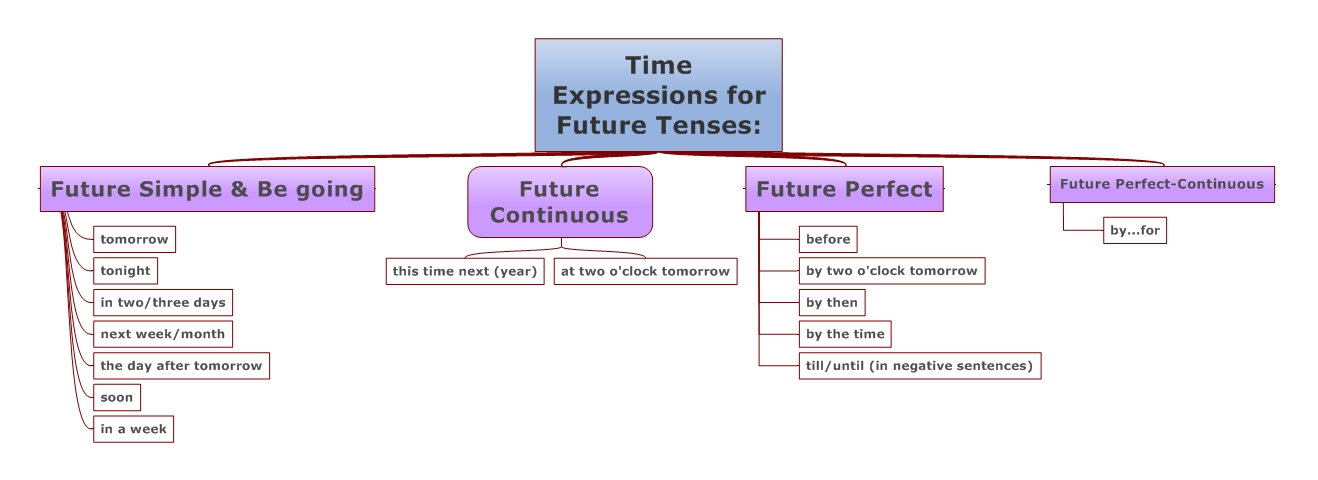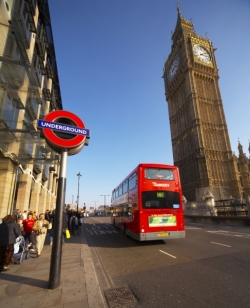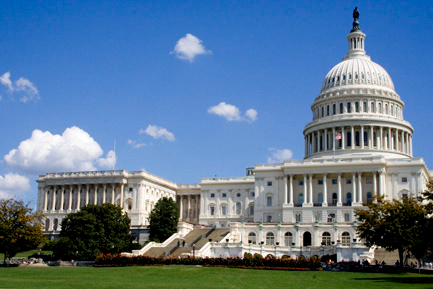Посібник з інтенсивного навчання англійської мови (для студентів внз спеціальності початкова освіта) Частина перша Київ 2013 удк ббк
 Скачать 5.32 Mb. Скачать 5.32 Mb.
|
|
LESSON FOUR. Part two 4. Grammar The more you practice the better you are prepared for communication. Practice 1: Review all the learnt tenses. Practice 2: Write sentences with the following verbs in present (4) and past (4) tenses. Don’t forget to use time expressions in each sentence. Wash, swim, train and cook. Now you are going to learn two more future tenses: Future Perfect and Future Perfect-Continuous. 4.1. Future Perfect Scheme: will have+ V-ed / Past Participle Study the table below, then grammar references and time expressions.
Revision: Study the situations when the future perfect tense is used. - An action will be finished in the future before / by a stated future time. I will have written the article before you come. I will have done this work by Friday. She will have delivered all the newspapers by 8 o’clock tomorrow morning. They will have immigrated to Canada by Christmas. He won’t have arrived until tonight (until / till are used in negative sentences.) She won’t have finished the report until 5 o’clock. Compare the situations used in past perfect and future perfect: - When he came home, Mary had already watched the film on TV. - When he comes home, Mary will have watched the film on TV. 4.2. Future Perfect-Continuous Scheme: will have been doing Study the table above, then grammar references and time expressions. Revision: Study the situations when the future perfect-continuous tense is used. - We emphasize the duration of an action up to a certain time in the future. By 2015, he will have been working for a building company for 20 years. I will have been learning French for six months by the end of the year. By the time they reach New York, they will have been travelling for two days. By his sixtieth birthday he will have been teaching for 35 years. How long will you have been starring in films by the time you are forty? Compare the situations used in past perfect-continuous and future perfect-continuous: - They had been looking for a house for a year before / by last April. - They will have been looking for a house for a year before / by next April. Important! As there are different tenses for present, past and future, TIME EXPRESSIONS help to differentiate the tenses. Learn and use them in the right place.  Practice –Grammar in use Task 1: Make up sentences in Future Tenses using time expressions. Task 2: Identify the tenses and match them to the correct descriptions. A: 1. I like these shoes. I’ll buy them. 2. They will have eaten lunch by two o’clock this afternoon. 3. I’m going to run my own company in the future. 4. This time tomorrow, I’ll be taking my driving test. 5. By the time Jack finishes the race, he will have been running for an hour. 6. I think he will win the competition. 7. I’ll tell Paul about the party. I’ll be seeing him at work anyway. 8. Will you be speaking to Rob later? I’ve got a message for him. 9. Look at the tree. It is going to fall down. 10. Since you’re tired, I’ll cook dinner tonight. B: a) an offer, promise, threat, etc; b) an action which will definitely happen in the future as a result of arrangement; c) a plan, intention, ambition we have for the future; d) predictions about the future; e) asking politely about someone’s plans for the near future to use them; f) an action which will be finished before a stated future time; g) to emphasize the duration of an action up to a certain time in the future; h) an action which will be in progress at a stated future time; i) on-the-spot decision; j) prediction when there is evidence that something will happen in the near future. Task 3: A. Put the verbs in brackets into the correct tense. Tomorrow night my friend Sophie is coming to visit me. Her train 1) ______ (arrive) at six o'clock and as I 2) _______ (still/work) at that time, we 3) _______ (meet) in the city centre at seven. I'm sure that we 4) _______ (have) dinner at Gianni's because we always seem to end up there. By the time we finished eating Sophie 5) ________(persuade) me to take her to the cinema because there's a film she wants to see. B. Which tense situations are used in part A? a) timetables / programmes; b) actions which will have finished before a stated future time; c) fixed arrangements in the near future; d) actions which will be in progress at a stated future time; e) predictions based on what we know Task 4: Underline the correct tense form.
Task 5: Put the verbs in brackets into the future simple or continuous, perfect or perfect-continuous tenses,as in the examples: A: By Monday morning, Kelly will have written (write) her History essay. B: Kelly can't come with us on Sunday because she will be writing (write) her History essay all the afternoon. 1. A: James can’t join us. He________ (work) all Saturday. B: By January he_________ (work) for a company for three years. 2. A: Susie __________ (clean) the house before Jack and Sally arrive. B: She __________ (clean) it for ages because the place is really untidy. 3. A: If Angela can get some time off work, we _________ (fly) to Paris for the weekend. B: If Angela gets time off work, at this time on Friday we (fly) to Paris. 4. A: Do you think we _________ (finish) the report today? B: Definitely, if we work hard we_________ (finish) it by three o' clock. 5. A: I ________ (move) to a bigger house next month. B: Fine! We _________ (wait) for this event for two years by this time. Check your answers for Grammar: lesson four, part 4.2, practice 2.
5  . Supplementary reading: Discover the world with us. . Supplementary reading: Discover the world with us.5.1. If you plan to visit another country what are you interested in more? – Its history? Great people? Curiosities? Entertainment? Landscape? Get some information from the texts about cities and towns of Great Britain. Surf the net if you want to enlarge your knowledge about the country. Text B: CITIES andTOWNS of BRITAIN London L  ondon, the capital of the country, is situated on both sides of the Thames. There are 14 bridges across the Thames. Today London stretches for nearly thirty miles from north to south and for nearly thirty miles from east to west. This is the area known as ‘Greater London.’ ondon, the capital of the country, is situated on both sides of the Thames. There are 14 bridges across the Thames. Today London stretches for nearly thirty miles from north to south and for nearly thirty miles from east to west. This is the area known as ‘Greater London.’When the Romans came to Britain in the first century A.D., London was a small village. Many of the roads built by the Romans met at the point where London Bridge now stands. In fact, there are several Londons. There is the ancient City of London, the oldest part of London. The City is the country’s financial and business centre. The Stock Exchange, the Royal Exchange and the Bank of England are all there. The City has a population of half a million. At night the City is a different place. There’s no traffic and very few people can be seen there. It's quiet and empty. The West End is famous for its shops, hotels and parks. It's the finest part of London. There are always crowds of tourists there. In the West End there are theatres, cinemas, museums, picture galleries and many big houses. The Houses of Parliament, Whitewall, Downing Street are all in the West End. Whitewall is the street, where all the Government offices are. It is the heart of the Government of Great Britain. If the City is the ‘money’ of London and the West End is the ‘goods’ of London, then the East End is the ‘hands’ of London. It is a district of docks, factories, little houses and narrow streets. Housing conditions in this part of London are very poor; lots of old houses have no modern conveniences. They are damp, dirty and dark. When you are in London don’t miss the chance to visit St. Paul’s Cathedral, the Tower of London, and Tower Bridge in The City of London; then the Houses of Parliament, Westminster Abbey and Whitehall are in Westminster and finally, Trafalgar Square, Piccadilly Circus, Buckingham Palace and Hyde Park in The West End. Enjoy your holiday! Cambridge – a University Town It lies on the river Cam and takes its name from the river. The ancient buildings, chapels, libraries and colleges are in the city centre. There are many museums in the old University City. Its population consists mostly of teachers and students. All students have to live in the college during their course. In the old times the students’ life was very strict. They were not allowed to play games, to sing, to hunt, to fish or even to dance. They wore special dark clothes which they continue to wear in our days. Many famous men studied here. Among them were Cromwell, Newton, Byron, Tennyson, Darwin and others. Edinburgh Edinburgh is the old capital of Scotland and one of the most beautiful cities in Europe. It is situated on the seven hills. From the streets, in the centre of the city you can see the ships coming to Edinburgh from different countries of the world. In the old part of the city there are narrow houses with narrow windows. The modern town is in the valley. The streets are straight and well-planned, so you can easily go about the town. The main street, Princess Street, is a mile long with beautiful houses and a monument to Walter Scott. The Old Town dates from the 11th century and contains most of the city’s historic sites. Edinburgh is Scotland’s banking and administrative centre. Birmingham – the Market Place In the heart of England is a city of Birmingham. Its population is over one million. It is the center of the iron industry and the heart of Britain’s motorway system. The district around Birmingham is called Black Country. It is the land of factories and mines. Buying and selling here has been an important part of life for more than eight hundred years. Today Birmingham is one of the biggest open-air markets and shopping centers in the UK. Manchester The city was founded in the Roman times. Years ago it was the centre of the cotton trade in the world. Now Manchester is the industrial capital of the Northern England. It has few ancient buildings, but few English cities can boast better parks of which there are over fifty. The largest of them is Heaton Park. Manchester is rich in libraries and schools. The University of Manchester was founded in 1880. Manchester is the fifth largest port in Great Britain though it is about 56 km away from the sea. Stratford-on- Avon April 23rd is Shakespeare’s birthday and is also the day he died. Both events happened in STRATFORD-on-AVON, a small town in the centre of England. The first place visitors go to is Shakespeare's birthplace, a small house with small rooms in the centre of the town. Then the visitors can have a look at the Royal Shakespeare Theatre, a big modern building. They say it’s the best stage in England. Practice: Which place(s) have you chosen to visit? What are your reasons? What would you like to visit and see there? Help: Ancient – старовинний Population – населення Convenience – зручність Valley – долина Boast – хвастати  5.2. Reading: get some information from the text about the United States of America. Text C: The USA – the COUNTRY of DIVERSITY Capital: Washington, D.C. Form of government: Republic. Physical features: The longest river – Missouri; the largest lake – Michigan; the largest island – Hawaii. Flag: Adopted on June 14, 1777. M  otto: In God We Trust. otto: In God We Trust.National anthem: “The Star-spangled Banner.” Bird: Bald Eagle. Flower: Rose. O beautiful for spacious skies, For amber waves of grain, For purple mountain majesties Above the fruited plain! The United States of America, the USA in short, is the third largest country in the world in population, and it is the fourth largest country in area. The USA is a federal state. It includes 50 states and the District of Columbia. The Congress is the highest legislative body in the country. It consists of two chambers: the House of Representatives and the Senate. President is the head of the state and the Government. The United States is the greatest industrial nation in the world. Its mineral and agricultural resources are tremendous. It's the world's largest producer of electrical and nuclear energy. The USA is a country of great differences. The country is blessed with a wealth of natural beauty. A traveller from almost any part of the world will find in the USA an area that can match anything he will meet at home. To imagine it well, read some lines about its rivers. The Mississippi is one of the world’s great rivers (6,400 kilometers); it was known to American Indians as the “father of waters.” Other important rivers are the Yukon in Alaska, the Rio Grande, the Columbia, which rises in western Canada and continues in the United States for about 1,900 kilometers west of the Rocky Mountains; and the Colorado, which begins in the Rocky Mountains. For 342 of its kilometers the Colorado flows through the magnificent Grand Canyon, carved through the ages by the river's waters. Other well-known rivers include the Hudson, which meets the Atlantic Ocean at New York City; the Potomac, bordering the national capital at Washington; and the Ohio, which flows west from the Appalachian Mountains to meet the Mississippi. One can speak much about the USA, a new state on the map of the world. More than two-hundred history of it is rich in excitement and drama: the transformation of an untamed land into a mighty industrial power; the growth of a basically English colony into a complex multiethnic society. There have been moments of triumph and sadness, but throughout there also has been remarkable faithfulness to the democratic ideals proclaimed at the moment of the nation’s birth. Washington Washington called after George Washington, the first President of the United States, is the capital of the United States. It is situated on the Potomac River. It is the District of Columbia. This district does not belong to any one state but to all the states. The district is named in honour of Columbus, who discovered America. S  pecially planned and built as a national capital, Washington was laid out by French architect in the 18th century. It is not as large as New York, Chicago, Philadelphia, Detroit or Los Angeles. It has a population of over 900,000 people. Washington is one-industry town. That industry is government. It produces only scrap paper. Every day twenty-five railway cars leave Washington loaded with scrap-paper. pecially planned and built as a national capital, Washington was laid out by French architect in the 18th century. It is not as large as New York, Chicago, Philadelphia, Detroit or Los Angeles. It has a population of over 900,000 people. Washington is one-industry town. That industry is government. It produces only scrap paper. Every day twenty-five railway cars leave Washington loaded with scrap-paper.The capital is famous for its historical places. Among the largest and tallest buildings is the Capitol with its great Hall of Representatives and Senate Chamber. There are no sky-scrapers in Washington because no other building must be taller than the Capitol. The White House is the President's residence. All American presidents except George Washington had lived in the White House. It was built in 1799. In 1814, during the war with England, the White House was burnt down. After the war the remains of the building were whitewashed. Since that time the residence of the American presidents has been always painted white. A city of great beauty and a center of world affairs, it is also a leading cultural centre. 5.3. Conversational Topic: Speak about your plans to visit one of the English-speaking countries – When? Why? What? 6  . Written Task . Written TaskUse the vocabulary of the texts A, B, C and write an essay “Why does Great Britain / or the USA attract tourists?” Follow the structure of any writing in the English language, it consists of three steps: Introduction: the purpose and content of our writing is presented in two-three sentences. Main body: two or more paragraphs will cover the topic. Each of them presents a separate viewpoint supported by reasons / examples. Ideas should be united with the help of linking words as: to begin with / to start with; personally, I think, to tell you the truth / frankly speaking, as a matter of fact, this would mean that, instead of, inspite of / despite, however, besides, what is more, in this way, although, such as, for example, in conclusion, so that, on condition that, finally, all things considered, etc. Avoid a ‘good-bad’ syndrom but use a variety of other adjectives and adverbs to make your writing attractive both to you and a reader. Conclusion: we summarise our opinion using different words, either we can give our personal comments and recommendations. Checklist: before handing in your piece of writing, check the content (interesting / well developed?), the organization (paragraphs and sentences well-linked together?); accuracy (if there are any errors in spelling, punctuation, grammar, etc) and a range of vocabulary and grammar. _  ___________________________________________________________________________________________________________________________________ ___________________________________________________________________________________________________________________________________Test Four TEST FOUR Grammar and Vocabulary 1. Circle the correct item.
2. Fill in the missing word.
LESSON FIVE “The language is a theatre in which the words are the actors.” Ferdinand Brunetiere  L  ESSON FIVE. Part one ESSON FIVE. Part one 1. Phonetics 1.1. Techniques of reading Task 1: “Stairs”: Add one word to every sentence to make it as long as possible. Practice reading the sentences one by one until you feel that different words are stressed in them. Read the example and then make up yours. Mind that intonation is different in general (rising tone) and special (falling tone) questions. Does your fellow sing? What does your fellow sing? Which songs does your fellow sing? What kind of songs does your fellow sing? What kind of songs does your fellow usually sing? What kind of American songs does your fellow usually sing? What kind of American songs does your best fellow usually sing? Now it’s your turn. Your sentences are: Do you play tennis? Does Nick get letters? Task 2: Spell the words Weather, frequently, sometimes, occasionally, tomorrow, yesterday, Wednesday, Thursday. Task 3: Read the phrases with the rising tone. Memorize them and use in speech. Frankly speaking; just a moment; as a matter of fact; after all; on the whole; for instance; it seems to me; I’m sorry to say; let me see; on the contrary; by the way; no doubt; well; as a rule; excuse me; I beg your pardon; if you please. 1.2. Vocabulary Bank Task 1: Read and study the derivatives. To admire – admirer – admiration –admirable; To believe – (dis)belief - believer– (un)believable; To entertain – entertainer – entertainment – entertaining; To favour – favourite – favour –favourable; To act/activate – actor/actress – act/action/activation/activity – active; To collect – collection/collector – collective/collected; To construct – constructor – construction – constructive. Task 2: Make possible derivatives of the words: nation, free, happy, import, combine, fame, attract and organize. Task 3: Make compound adjectives to describe things. E.g.: A walk that takes ten minutes – A ten –minute walk
2. Grammar 2.1. Grammar Tenses Study and revise the whole table of grammar tenses, including four tenses of Future in the Past which are used for probable or imaginary actions usually in conditional sentences. Compare the translation: I would do it / Я би зробив це. You have learned all the tenses in the Active Voice. If you practice hard, you’ll become an expert in this part of grammar. You will speak to foreigners and understand them rather well.
Practice – Grammar in use Task 1: Using the table of tenses and time expression make up sixteen sentences. Try one situation for a tense. Task 2: Match actions to grammar tenses. ACTIONS: 1. She was writing poems this time last week. 2. He has taken part in the Olympic games recently. 3. He would be watching the film if he had time. 4. He finished his project two days ago. 5. They will be inventing new computer games this time next week. 6. Mary would have bought that dress if she had had money yesterday. 7. She will have been preparing for a jazz festival for a week by next Tuesday. 8. He had won the game by the time you came. 9. We always enjoy fresh air in the forest. 10. I would have been travelling for a month by this time if I had booked tickets in advance. 11. I’m sure, she will invite me to the party. 12. They are waiting for us at this moment. 13. I would wait for you if I were not in a hurry. 14. She had been checking the test since Wednesday. She looked tired. 15. I will have written a letter to Sophie by tomorrow. 16. He has been telling stories for hours. He is so inventive. GRAMMAR TENSES:
Task 3: Make up sentences of your own using a list of tences given above.
To-infinitive; Bare Infinitive and Gerund (-ing form) Study the examples: I want to read (to-infinitive is used). Let me read (bare infinitive). I like reading (gerund or –ing form of the verb). Revision: Read and translate three parts of examples below. Pay attention to the underlined forms. Give your explanation to the changes in each block. a) I want you to come on Sunday. He promised to help us with the decorations. He seems to be working hard. He explained how to operate the machine. I am pleased to meet you. To tell you the truth, I don’t know how to react. She is too young to stay out so late. It’s too cold for him to go swimming. It isn’t warm enough for him to go swimming. He is clever enough not to worry about this situation. It wasn’t clever of you not to believe him. b) He should apologize for his words. They saw her talk to the manager (- bare infinitive is used to express a complete action). I can do it myself. Could you open the door? Let him go. He made me laugh. I had better see a doctor. He helped me do it (also correct: He helped me to do it.) c) I like travelling. Reading is the best practice. I suggested eating out together. I finished watching a film. He became rich by working. He has difficulty in writing. What’s the use of crying? I look forward to getting a letter from you. They saw her talking to the manager (- gerund is used to express an incomplete action). Now study grammar references and get ready to do the exercises. Practice – Grammar in use Task 1: Complete the sentences with the infinitive or gerund form of the words in brackets.
Task 2: Complete the sentences either with to go or going . E.g.: I expect … I expect to go out with Jane tonight.
Task 3: To-Infinitive? Bare Infinitive? Gerund? Chain story: Make up a story using the words in the list in any order you like. Cross out the used words so that you won’t use them again. E.g.: John likes travelling abroad. One day… like, love, manage, mind, write, threaten, hope, must, start, finish, hate, regret, avoid, arrange, afford, look forward to, want, can’t stand, decide. Task 4: Study the ways to agree / or disagree with somebody. |

 report which has twelve pages.
report which has twelve pages.